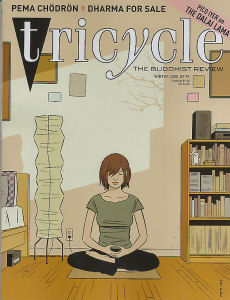TRICYCLE: The Buddhist Review

Today we note the arrival in the newsstand of a magazine whose name fascinated me when I first came across it some months ago. It's Tricycle: The Buddhist Review, published by The Tricycle Foundation in New York City. While the name continues to mystify, I can now report that I've skimmed an issue of this handsome quarterly and have found its contents equally fascinating. The magazine is about being a Buddhist in contemporary America, or at least trying to apply Buddhist teachings and wisdom to the challenges of life in a frenetic and materialistic culture. This can get almost surreal. One article in the new Winter 2005 issue is about Andrew Black, a world-class poker player from Northern Ireland who left the game for five years to join a Buddhist organization in the United Kingdom, only to roar back to finish in the top five in the 2005 World Series of Poker in Las Vegas. He claims his Buddhist mindset helps him at the green felt table, though he acknowledges there are unresolved conflicts and contradictions in the situation. Politically, the magazine lists gently to the left. You'll find a report on the first Spiritual Activism Conference, held in Berkeley, CA last summer, in which various religious and spiritual figures tried to figure out a way to break "the monopoly on politico-religious discourse enjoyed by Christian fundamentalists in recent decades." While author Phil Catalfo complains that non-Judeo-Christian spiritual traditions didn't get enough exposure at the conference, he offers interesting suggestions on how Buddhist principles―conflict resolution, anger management, avoidance of demonization of opponents―can help those on the religious left organize and struggle more effectively. Helen Tworkov, the founding editor of Tricycle, contributes an interesting essay on the feminist movement and Buddhism. She starts it off with elements of a traditional "guide to good behavior":
* Put on an ever-smiling countenance.
* Do not move furniture and chairs noisily.
* Do not open doors with violence.
* Take pleasure in the practice of humility.
* Always strive to learn from everyone.
* Speak with moderation, gently.
* Express yourself with modesty.
Though Ms. Tworkov notes that these sound like "a set of guidelines for prim boarding-school girls of the 1940s," she reports that they are advice from the Buddhist sage Shantideva to his fellow monastics in eighth-century India. The obvious conflict for female Buddhists in 2005 America is that these imperatives represent―at least at one level―much that modern feminism seeks to overcome. Lastly, I must mention an interview with Buddhist scholar Mo Soeng, long-time co-director of the Barre Center for Buddhist Studies in Massachusetts, who rails (thoughtfully) against some trends in American Buddhism, such as the establishment of posh retreat centers run by celebrity monks who court media attention. "A lot of what goes on in Buddhism in America is about creating a personal story and an identity," he reports. "Dharma centers can become social clubs that allow people to process an identity, allowing them to feel good about themselves for a short period of time. I meet people who tell me, 'I am a Theraveda person' or 'I am a Zen person.' But this is just another process of commodification, of packaging oneself… Yes, there is some connection to Buddhist practice, but underneath it all people don't really want to displace their personal and social identities or their inherited Judeo-Christian worldview." If you're interested in Buddhist philosophy and how it applies to contemporary Western life, Tricycle is a must-read. By the way, we've added a great cover from a prior issue of Tricycle to our little gallery of favorite magazine covers: Take a look! An annual subscription (four issues) is $24.00 from the publisher; you can get a sample copy from us for $2.59.


0 Comments:
Post a Comment
<< Home